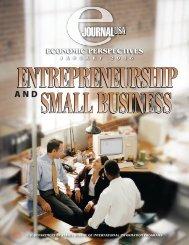s. history us history us history - Embassy of the United States
s. history us history us history - Embassy of the United States
s. history us history us history - Embassy of the United States
- No tags were found...
Create successful ePaper yourself
Turn your PDF publications into a flip-book with our unique Google optimized e-Paper software.
CHAPTER 4: THE FORMATION OF A NATIONAL GOVERNMENTOUTLINE OF U.S. HISTORYquired was a fundamental rethinking<strong>of</strong> <strong>the</strong> Confederation.The Annapolis conference issueda call for all <strong>the</strong> states to appointrepresentatives to a convention to beheld <strong>the</strong> following spring in Philadelphia.The Continental Congress wasat first indignant over this bold step,but it acquiesced after Washingtongave <strong>the</strong> project his backing and waselected a delegate. During <strong>the</strong> nextfall and winter, elections were heldin all states but Rhode Island.A remarkable ga<strong>the</strong>ring <strong>of</strong> notablesassembled at <strong>the</strong> Federal Conventionin May 1787. The state legislaturessent leaders with experiencein colonial and state governments, inCongress, on <strong>the</strong> bench, and in <strong>the</strong>army. Washington, regarded as <strong>the</strong>country’s first citizen beca<strong>us</strong>e <strong>of</strong> hisintegrity and his military leadershipduring <strong>the</strong> Revolution, was chosenas presiding <strong>of</strong>ficer.Prominent among <strong>the</strong> more activemembers were two Pennsylvanians:Gouverneur Morris, who clearly saw<strong>the</strong> need for national government,and James Wilson, who laboredindefatigably for <strong>the</strong> national idea.Also elected by Pennsylvania wasBenjamin Franklin, nearing <strong>the</strong> end<strong>of</strong> an extraordinary career <strong>of</strong> publicservice and scientific achievement.From Virginia came James Madison,a practical young statesman, a thoroughstudent <strong>of</strong> politics and <strong>history</strong>,and, according to a colleague, “froma spirit <strong>of</strong> ind<strong>us</strong>try and application ...<strong>the</strong> best-informed man on any pointin debate.” He would be recognizedas <strong>the</strong> “Fa<strong>the</strong>r <strong>of</strong> <strong>the</strong> Constitution.”Massach<strong>us</strong>etts sent Ruf<strong>us</strong> Kingand Elbridge Gerry, young men <strong>of</strong>ability and experience. Roger Sherman,shoemaker turned judge, wasone <strong>of</strong> <strong>the</strong> representatives fromConnecticut. From New York cameAlexander Hamilton, who had proposed<strong>the</strong> meeting. Absent from<strong>the</strong> Convention were Thomas Jefferson,who was serving as ministerrepresenting <strong>the</strong> <strong>United</strong> <strong>States</strong> inFrance, and John Adams, serving in<strong>the</strong> same capacity in Great Britain.Youth predominated among <strong>the</strong> 55delegates — <strong>the</strong> average age was 42.Congress had authorized <strong>the</strong>Convention merely to draft amendmentsto <strong>the</strong> Articles <strong>of</strong> Confederationbut, as Madison later wrote, <strong>the</strong>delegates, “with a manly confidencein <strong>the</strong>ir country,” simply threw <strong>the</strong>Articles aside and went ahead with<strong>the</strong> building <strong>of</strong> a wholly new form<strong>of</strong> government.They recognized that <strong>the</strong> paramountneed was to reconcile twodifferent powers — <strong>the</strong> power <strong>of</strong>local control, which was alreadybeing exercised by <strong>the</strong> 13 semi-independentstates, and <strong>the</strong> power <strong>of</strong>a central government. They adopted<strong>the</strong> principle that <strong>the</strong> functions andpowers <strong>of</strong> <strong>the</strong> national government— being new, general, and incl<strong>us</strong>ive— had to be carefully definedand stated, while all o<strong>the</strong>r functionsand powers were to be understood asbelonging to <strong>the</strong> states. But realizingthat <strong>the</strong> central government had tohave real power, <strong>the</strong> delegates alsogenerally accepted <strong>the</strong> fact that <strong>the</strong>government should be authorized,among o<strong>the</strong>r things, to coin money,to regulate commerce, to declarewar, and to make peace.DEBATE AND COMPROMISEThe 18th-century statesmen whomet in Philadelphia were adherents<strong>of</strong> Montesquieu’s concept <strong>of</strong> <strong>the</strong>balance <strong>of</strong> power in politics. Thisprinciple was supported by colonialexperience and streng<strong>the</strong>ned by <strong>the</strong>writings <strong>of</strong> John Locke, with whichmost <strong>of</strong> <strong>the</strong> delegates were familiar.These influences led to <strong>the</strong> convictionthat three equal and coordinatebranches <strong>of</strong> government should beestablished. Legislative, executive,and judicial powers were to be soharmonio<strong>us</strong>ly balanced that noone could ever gain control. Thedelegates agreed that <strong>the</strong> legislativebranch, like <strong>the</strong> colonial legislaturesand <strong>the</strong> British Parliament, shouldconsist <strong>of</strong> two ho<strong>us</strong>es.On <strong>the</strong>se points <strong>the</strong>re was unanimitywithin <strong>the</strong> assembly. Butsharp differences also arose. Representatives<strong>of</strong> <strong>the</strong> small states — NewJersey, for instance — objected tochanges that would reduce <strong>the</strong>ir influencein <strong>the</strong> national governmentby basing representation upon populationra<strong>the</strong>r than upon statehood,as was <strong>the</strong> case under <strong>the</strong> Articles <strong>of</strong>Confederation.On <strong>the</strong> o<strong>the</strong>r hand, representatives<strong>of</strong> large states, like Virginia,argued for proportionate representation.This debate threatened to goon endlessly until Roger Shermancame forward with arguments forrepresentation in proportion to <strong>the</strong>population <strong>of</strong> <strong>the</strong> states in one ho<strong>us</strong>e<strong>of</strong> Congress, <strong>the</strong> Ho<strong>us</strong>e <strong>of</strong> Representatives,and equal representation in<strong>the</strong> o<strong>the</strong>r, <strong>the</strong> Senate.The alignment <strong>of</strong> large againstsmall states <strong>the</strong>n dissolved. Butalmost every succeeding questionraised new divisions, to be resolvedonly by new compromises. Nor<strong>the</strong>rnerswanted slaves counted whendetermining each state’s tax share,but not in determining <strong>the</strong> number<strong>of</strong> seats a state would have in <strong>the</strong>Ho<strong>us</strong>e <strong>of</strong> Representatives. Under acompromise reached with little dissent,tax levies and Ho<strong>us</strong>e membershipwould be apportioned accordingto <strong>the</strong> number <strong>of</strong> free inhabitantspl<strong>us</strong> three-fifths <strong>of</strong> <strong>the</strong> slaves.Certain members, such as Shermanand Elbridge Gerry, still smartingfrom Shays’s Rebellion, fearedthat <strong>the</strong> mass <strong>of</strong> people lacked sufficientwisdom to govern <strong>the</strong>mselvesand th<strong>us</strong> wished no branch <strong>of</strong> <strong>the</strong>federal government to be elected directlyby <strong>the</strong> people. O<strong>the</strong>rs thought<strong>the</strong> national government should begiven as broad a popular base aspossible. Some delegates wished toexclude <strong>the</strong> growing West from <strong>the</strong>opportunity <strong>of</strong> statehood; o<strong>the</strong>rschampioned <strong>the</strong> equality principleestablished in <strong>the</strong> Northwest Ordinance<strong>of</strong> 1787.There was no serio<strong>us</strong> differenceon such national economic questionsas paper money, laws concerningcontract obligations, or <strong>the</strong> role<strong>of</strong> women, who were excluded frompolitics. But <strong>the</strong>re was a need for7273












